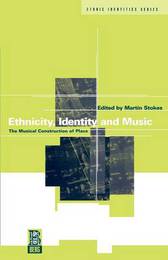
|
Ethnicity, Identity and Music: The Musical Construction of Place
Paperback / softback
Main Details
| Title |
Ethnicity, Identity and Music: The Musical Construction of Place
|
| Authors and Contributors |
Edited by Martin Stokes
|
| Series | Ethnicity and Identity Series |
|---|
| Physical Properties |
| Format:Paperback / softback | | Pages:212 | | Dimensions(mm): Height 216,Width 138 |
|
| Category/Genre | Music |
|---|
| ISBN/Barcode |
9781859730416
|
| Classifications | Dewey:306.484 |
|---|
| Audience | |
|---|
| Illustrations |
bibliography, index
|
|
Publishing Details |
| Publisher |
Bloomsbury Publishing PLC
|
| Imprint |
Berg Publishers
|
| Publication Date |
1 May 1997 |
| Publication Country |
United Kingdom
|
Description
- Directly relevant to the needs of teachers and researchers in music, musicology, ethnomusicology and social anthropology. This book examines the significance of music in the construction of identities and ethnicities, and suggests ways to understand music as social practice. The authors focus on the role of music in the construction of national and regional identities; the media and 'postmodern identity'; concepts of authenticity; aesthetics; meaning; performance; 'world music'; and the use of music as a focus for discursive evocations of 'place'. The chapters tackle a wide range of subjects including 16th century etiquette, Celtic music and Chopin. The volume will be of interest to social anthropologists, and those working in the fields of cultural studies, politics, gender studies, musicology and folklore.
Author Biography
Martin Stokes University of Chicago
Reviews'All [the individual essays] have important contributions to make, and are jammed full of engaging refrains, dynamic and resonant points, arranged with skill and attention to harmony in the composition and orchestration of a sustained debate. There is no question that the book is an accomplished result from a series of seminars.' Anthropological Notebooks 'A very rich array of concrete problems [...] Martin Stokes does a marvellous job of integrating the essays and of showing how each does its part to develop social theory by considering knots of local and global experience. [...] This collection promises a fresh breeze and new initiative for ethnomusicology, and perhaps a bit of humour as well in the form of internal discrepancies and divergent points of view.' MAN
|